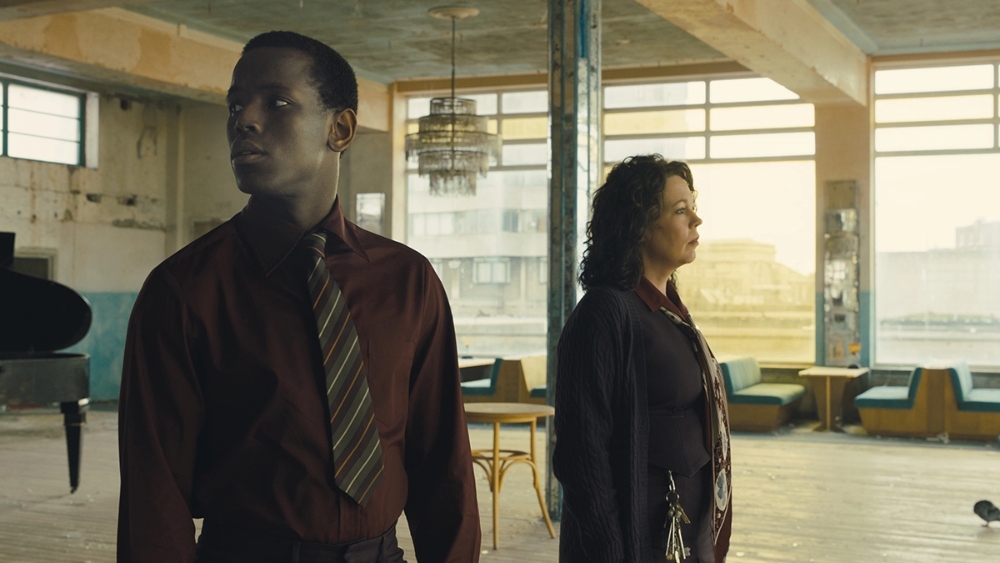
Director Sam Mendes returns to the big screen with Empire of Light, which he described at the Telluride Film Festival world premiere as his most personal film yet.
The film stars Oscar winner Olivia Colman as Hilary Small, who manages a local movie theater in a Southern English coastal town. Eventually, Hilary develops a romantic relationship with a new staffer named Stephen (Micheal Ward) who works the ticket booth. He is much younger than her, and he is Black — just as Margaret Thatcher’s brand of conservatism begins to take over the country in the early ’80s. It is hard to identify which character is supposed to represent Mendes, though the film stands on its own merit as an old-school, Oscar-ready ode to cinema and a love poem to nostalgia. Eventually, Mendes’ script meanders too schizophrenically about several subject matters, and the question of “what exactly is personal about this?” is never answered. But a career-best performance from Colman and strong production values make Empire of Light a mostly successful film.
The term “Oscar-bait” has developed a negative connotation these days, but what else is one supposed to call a movie featuring cinematography from Roger Deakins, a score from Trent Reznor and Atticus Ross, expert editing by Lee Smith, and a supporting turn from Mendes and Colman’s fellow Oscar winner Colin Firth? I mean, just how many Academy Awards do one film’s cast and crew need?
The problem with Empire of Light — as is typical when such talent is amassed — is that no one is going to step in to correct whatever error the human beings involved with the project embed into it. How could any of these people do any wrong? For the most part, they do not, except for Mendes’ overly ambitious screenplay. As the story setup portends, he touches upon a wide array of subject matters intermittently, rather than cohesively. The healing power of film is obviously there, and the movie theater’s bright yellow, neon marquee announcing “Empire” shines brightly ever so often to remind us of the good old days.

At the same time, the dying or ever-changing nature of the filmgoing experience is a separate topic, with the titular movie theater already boarding down, shutting down, with audiences less interested in the big old spectacles of yore. Other themes include, of course, the insidious racism that slowly gripped Britain once more, solitude and aging, and mental health. There is so much going on and the story jumps frustratingly from one to the other, never grounding itself in any of these themes. The problem is not that they are cliché — Mendes is good enough to make them feel not so — the problem is that they are all over the place.
Aside from that one obvious flaw, one can comfortably say that Empire of Light is an otherwise perfectly rendered picture. Deakins’ camera gives you carefully-lit shots of the darkened movie theater, and he uses a particular trick — shooting from the inside of the movie theater’s lobby through the glass doors, across the street, and into the moody, somber sea — to magnificent effect. From inside movies, we are safe, protected, and sheltered from the crashing waves that may seem inviting but are far more treacherous. He also has sweeping panoramas of the crumbling building and its shining lights as the seasons change across the beach, but it is that recurring inside shot that most exemplify Deakins’ unique cinematographic vision.
Meanwhile, Ross and Reznor grace us with their usual cymbals and those echoing, spiraling sounds that we’ve come to know since The Social Network, which create a sense of emotional depth and longing. Their scores often evoke a certain wistfulness about the perverse, the hopeless, and the innate foulness of the human condition. Here, though, they add a touch of sweetness and even hope, perhaps, through extended piano sequences (bereft of their usual echoing spirals) that once again show their versatility.
The remainder of the kudos belong to Colman and newcomer Micheal Ward, who share strong chemistry together. Hilary’s last name says it all — she is a sad, meandering, even pitiful aging woman. She is alone and lonely, humiliated, and debased into performing denigrating sexual favors for the boss (Firth) while being ignored by most of her younger, punky coworkers. She is a “cat lady” in a very unfunny way. Colman pulls at your heartstrings very violently before Ward’s Stephen even enters the picture.

Eventually, he does, and the two show each other things about life that had been missing in their respective experiences. Stephen’s mother is a working, immigrant nurse, and the two tend to a dove with a broken wing during their trysts in the abandoned, upper decks of the crumbling theater. She encourages him to pursue his dreams and to study. Through his experiences, she discovers the unfairness of the world all over again, her problems seeming both small and grander at the same time. Eventually, schizophrenia rears its ugly head again, which is when Colman really dials it up to another, disturbing emotional level that is absolutely gripping. As noted, the story does vacillate constantly, but Colman’s magnetic pull is so powerful that she keeps you locked in where another actress would have been unable to stop the script from losing you.
In the end, it is not very easy to identify what exactly is “personal” to Mendes about this film, beyond the obvious nostalgia for the movies and the general sense of shared human experiences about loneliness and longing. Perhaps that is the only point — the movies create shared experiences that speak to us at different levels, even when the stories are not about us in the strictest way. In that sense, Empire of Light is an effective picture that in past lives would have waltzed its way to the Oscar podium repeatedly, but will itself become emblematic of just how the moviegoing experience has changed these days.
Grade: B+
Empire of Light premiered at the Telluride Film Festival on Sept. 3 and will be released in U.S. theaters on Dec. 9 by Searchlight Pictures.





